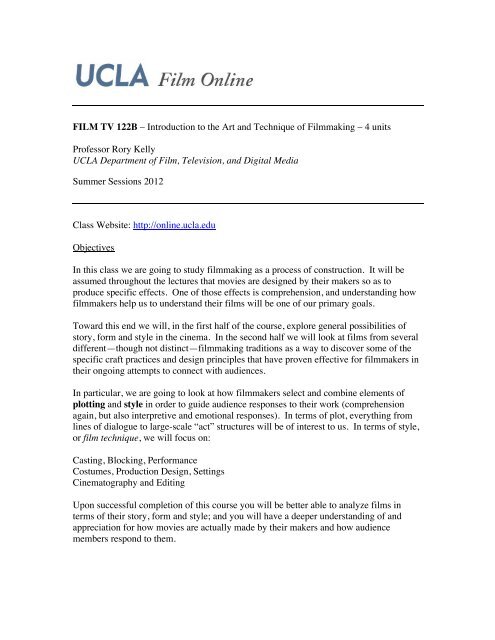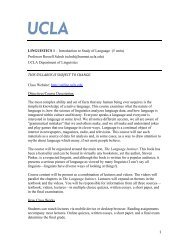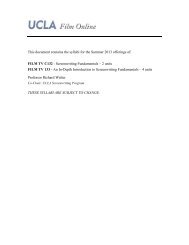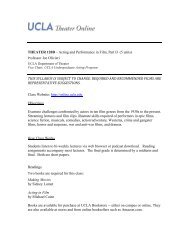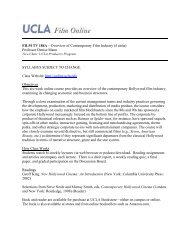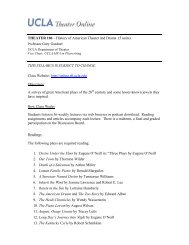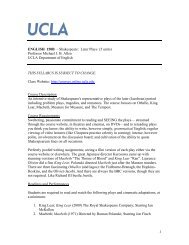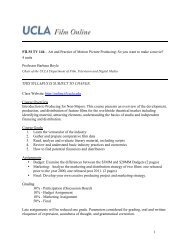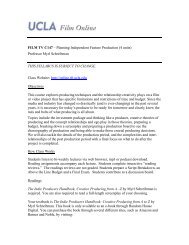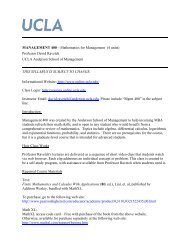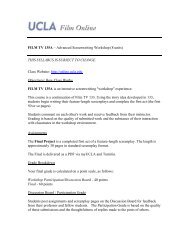FILM TV 122B - UCLA Summer Sessions Online Courses
FILM TV 122B - UCLA Summer Sessions Online Courses
FILM TV 122B - UCLA Summer Sessions Online Courses
You also want an ePaper? Increase the reach of your titles
YUMPU automatically turns print PDFs into web optimized ePapers that Google loves.
<strong>FILM</strong> <strong>TV</strong> <strong>122B</strong> – Introduction to the Art and Technique of Filmmaking – 4 units<br />
Professor Rory Kelly<br />
<strong>UCLA</strong> Department of Film, Television, and Digital Media<br />
<strong>Summer</strong> <strong>Sessions</strong> 2012<br />
Class Website: http://online.ucla.edu<br />
Objectives<br />
In this class we are going to study filmmaking as a process of construction. It will be<br />
assumed throughout the lectures that movies are designed by their makers so as to<br />
produce specific effects. One of those effects is comprehension, and understanding how<br />
filmmakers help us to understand their films will be one of our primary goals.<br />
Toward this end we will, in the first half of the course, explore general possibilities of<br />
story, form and style in the cinema. In the second half we will look at films from several<br />
different—though not distinct—filmmaking traditions as a way to discover some of the<br />
specific craft practices and design principles that have proven effective for filmmakers in<br />
their ongoing attempts to connect with audiences.<br />
In particular, we are going to look at how filmmakers select and combine elements of<br />
plotting and style in order to guide audience responses to their work (comprehension<br />
again, but also interpretive and emotional responses). In terms of plot, everything from<br />
lines of dialogue to large-scale “act” structures will be of interest to us. In terms of style,<br />
or film technique, we will focus on:<br />
Casting, Blocking, Performance<br />
Costumes, Production Design, Settings<br />
Cinematography and Editing<br />
Upon successful completion of this course you will be better able to analyze films in<br />
terms of their story, form and style; and you will have a deeper understanding of and<br />
appreciation for how movies are actually made by their makers and how audience<br />
members respond to them.
How Class Works<br />
Students listen to bi-weekly lectures via web browser. Reading assignments accompany<br />
all lectures and film viewings accompany many of the lectures. Your final grade is<br />
determined by two midterms, a final, and by your participation in the online discussion<br />
activities facilitated by your TA.<br />
Readings<br />
One book is required: Film Art: An Introduction (9th edition) by David Bordwell and<br />
Kristin Thompson. Please do not purchase an older edition, as the page numbers in the<br />
course schedule below will not be of any use to you. Film Art is available for purchase at<br />
the <strong>UCLA</strong> Bookstore—either on campus or online. It is also available at other stores and<br />
online booksellers such as Amazon.com.<br />
Additional required reading assignments, as indicated in the course schedule, will be<br />
made available for download from the class website.<br />
Because of the additional reading assignments and short length of the course you are only<br />
being assigned readings from eight of the twelve chapters in Film Art. Oftentimes you<br />
are only being assigned parts of chapters. This should make your life easier.<br />
You are encouraged, though, to read Film Art in its entirety if you can, either this term or<br />
in the near future when you have a bit more time. However, you are only expected to be<br />
familiar with the material in the assigned readings, each of which should be completed<br />
before viewing the lecture it is assigned for.<br />
Required Films<br />
Before beginning the reading assignments please watch The Wizard of Oz and ET: The<br />
Extra-Terrestrial. ET is probably most important film you will watch for the class, at<br />
least in terms of three exams, which have many questions that refer to it. For this reason<br />
you may want to get and hold onto a copy of ET for the duration of the course.<br />
You are expected to watch ET, The Wizard of Oz, and all the films assigned in this class,<br />
on a high quality video format, such as DVD. All the films assigned in this class can be<br />
found at Netflix, iTunes or local video stores.<br />
The required films are also streamed at low resolution from the Calendar section of the<br />
class website. These streams are not suitable for viewing a film in its entirety. They are<br />
provided for review purposes only. They serve as easy reference for taking the exams<br />
and responding to discussion questions.<br />
2
Assignments and Exams<br />
1 – Midterm Exam #1. Comprised of short essay questions based on lectures 1 thru 3 and<br />
the accompanying film screenings and reading assignments.<br />
2 – Midterm Exam #2. Comprised of short essay questions based on lectures 4 thru 6 and<br />
the accompanying film screenings and reading assignments.<br />
3 – Final Exam. Comprised of short essay questions based on lectures 7 thru 11 and the<br />
accompanying film screenings and reading assignments<br />
Grade Breakdown<br />
Final grades will be calculated as follows:<br />
Participation – 25%<br />
Midterm Exam #1 – 25%<br />
Midterm Exam #2 – 25%<br />
Final Exam – 25%<br />
Please note that each of the exams is due not only by a particular day but by a particular<br />
time (see course schedule below). You must submit each exam by its due date/due time.<br />
Late exams will be marked down a full letter grade (10 pts).<br />
Policies<br />
This class takes advantage of My<strong>UCLA</strong> and a third-party service known as Turnitin.<br />
Submissions are screened for improper citations and potential plagiarism. Quotes or<br />
ideas paraphrased from other work must be properly cited. Turnitin flags all instances of<br />
plagiarism and answers that are plagiarized in whole or in part will receive zero credit.<br />
Anyone caught cheating from another student, past or present, will automatically fail the<br />
course. There is no exception to this rule. Do not turn in the work of other students as<br />
your own work. (Turnitin archives all student work that has and ever will be submitted at<br />
this university and every other college and university that uses Turnitin).<br />
Course Schedule<br />
Week One<br />
Lesson 1: Plot Structure and Story-Making in the Movies<br />
Reading: Film Art, Chap 2: The Significance of Film Form & Chap 3: Narrative as a<br />
Formal System pgs 78-92 only<br />
Screenings: The Wizard of Oz (1939) and ET: The Extraterrestrial (1982)<br />
3
Week One (Cont’d)<br />
Lesson 2: The Role of Style<br />
Reading: Film Art, Chap 1 pgs 3-8 “Artistic Decisions in Filmmaking” & excerpt<br />
“Cinematic Sequencing” from The Philosophy of Motion Pictures by Noël<br />
Carroll (available for download from the class website)<br />
Week Two<br />
Lesson 3: Setting, Costumes and Makeup<br />
Reading: Film Art, Chap 4: Mise-en-Scene pgs 118-130<br />
Midterm #1: Exam available Monday morning for download starting at 8:00 AM PDT<br />
Lesson 4: Casting and Performance<br />
Reading: Film Art Chap 4: Mise-en-Scene pgs 138-146 (performance)<br />
Week Three<br />
Midterm #1: Completed exam due on Tuesday by 6:00 PM PDT<br />
Lesson 5: Cinematography and Lighting<br />
Reading: Film Art, Chap 4: Mise-en-Scene pgs 131-138 (lighting) & Chap 5:<br />
Cinematography pgs 167-178 and 186-198 only<br />
Lesson 6: Classical Hollywood Cinema – History and Narrative Techniques<br />
Reading: Film Art, Chap 3: Narrative as a Formal System pgs 92-104 & Chap 12:<br />
Film History pgs 454-461 and pgs 470-473 (early and classical cinema)<br />
Screenings: The Apartment (1960); Jaws (1975); Jerry Maguire (1996)<br />
Midterm #2: Exam available Thursday morning for download starting at 8:00 AM PDT<br />
4
Week Four<br />
Lesson 7: Classical Hollywood Cinema – Plot Structure<br />
Reading: Excerpt “Modern Classicism” from Storytelling in the New Hollywood by<br />
Kristin Thompson (available for download from the class website)<br />
Midterm #2: Completed exam due on Wednesday by 6:00 PM PDT<br />
Lesson 8: Classical Hollywood Cinema – Editing and Shooting Strategies<br />
Reading: Film Art, Chap 6: Editing pgs 223-255 only<br />
Screenings: Re-watch The Apartment and Jerry Maguire (watch with the sound off as<br />
much as possible to pay attention to the editing and shooting strategies)<br />
Week Five<br />
Lesson 9: Plot Structure, Narrative Strategies and Style in the Art Film<br />
Reading: “The Art Cinema as a Mode of Film Practice” by David Bordwell<br />
(available for download from the class website) & Film Art Chap12: Film<br />
History pgs 473-475 (Italian Neorealism)<br />
Screening: Nights of Cabiria (1957)<br />
Lesson 10: Plot Structure, Narrative Strategies and Style in the Modernist Art Film<br />
Reading: Film Art, Chapter 12: Film History pgs 475-477 (French New Wave)<br />
Screening: Vivre sa vie (1962)<br />
Final Exam: Available Thursday morning for download starting at 8:00 AM PDT<br />
Week Six<br />
Lesson 11: New Hollywood: American Movies After the Art Film<br />
Reading: Film Art, Chap 9: Genre & Chap 12: Film History pgs 477-482 (New<br />
5
Hollywood) as well as “Chinatown and Generic Transformation in Recent<br />
American Films” by John G. Cawelti (available for download from the<br />
class website)<br />
Screening: Chinatown (1974)<br />
Final Exam: Completed exam due on Friday by 6:00 PM PDT<br />
6


